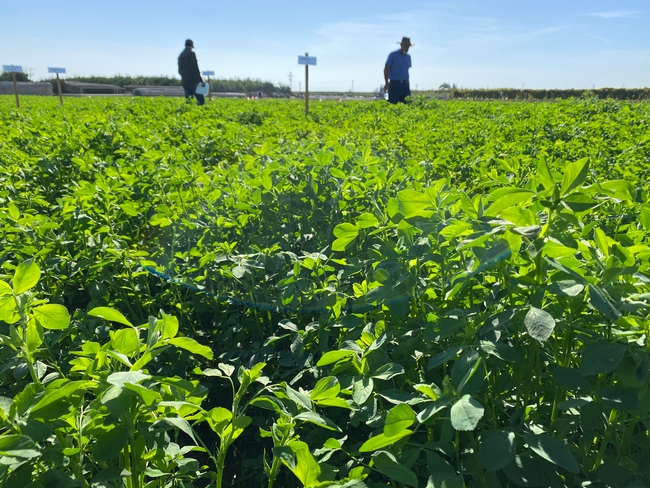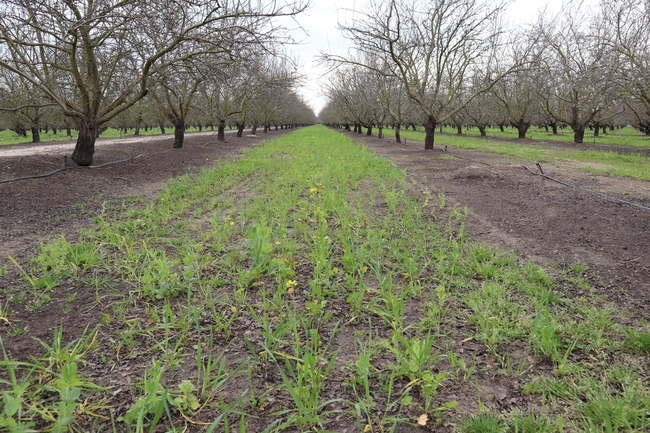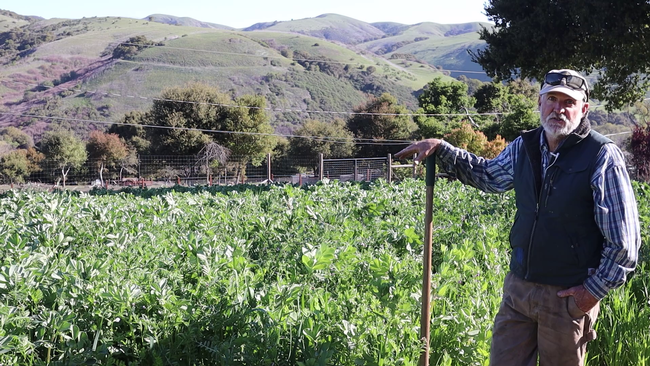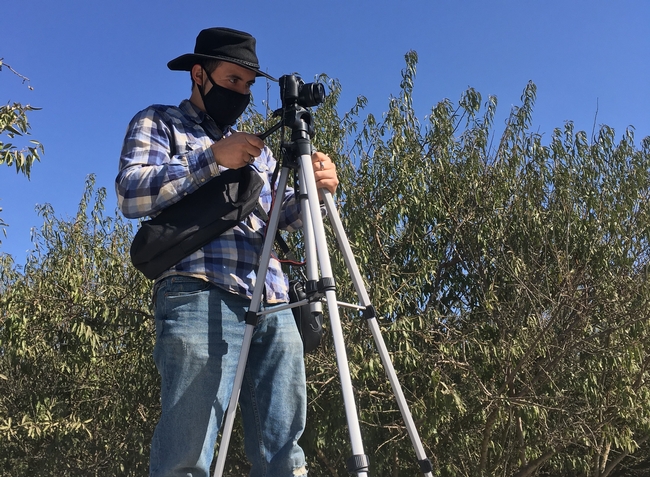Posts Tagged: cover crop
$1.7M granted for climate-smart planning led by UC ANR scientists
In California, natural and working lands make up 95 million acres of the state and play a vital role in building resilience to the impacts of climate change. University of California Agriculture and Natural Resources was awarded $1.7 million for the California Next Generation and Equitable Climate Action Plan, as part of the state's Natural and Working Lands Climate Smart Strategy and California's 30x30 Initiative, an effort to conserve 30% of the state's lands and coastal waters by 2030.
Natural and working lands include both unmanaged and managed areas actively used for agriculture, forestry or production purposes.
Chandra Richards, UC Cooperative Extension agricultural land acquisitions academic coordinator for Southern California, and Cristina Murillo-Barrick, UCCE's Black, Indigenous and People of Color community development advisor for the Bay Area, are leading the California Next Generation and Equitable Climate Action Plan project.
To build capacity and technical assistance for climate-smart action planning, Richards and Murillo-Barrick will use the Climate Smart Land Management Program funding, awarded through the California Department of Conservation, to focus on two of the most pressing climate action issues: equitable land access and land management diversification.
According to the 2022 U.S. Department of Agriculture census, demographic data indicates that California agricultural land ownership and production is concentrated within an aging and mostly White demographic. However, research suggests diverse management practices promote healthy landscapes. This has been shown to benefit the environment, human health and climate resilience in multiple ways.
For this reason, this project centers on “historically underrepresented communities,” a term that includes California Native American Tribes, communities of color, landless farmers, immigrant and non-English speaking communities and other agency-designated minority groups (racial, ethnic and non-male groups, socially disadvantaged farmers and ranchers, and California designated severely disadvantaged communities).
Focusing on Southern California, UC Cooperative Extension scientists will identify barriers to land access, management and opportunities to increase land manager diversity. They also will engage historically underrepresented communities in coalition building, capacity assessment and climate action planning.
Within the last few decades, Californians have faced increased ecosystem stressors and decreasing diversity of natural systems. This pattern continues to damage already-vulnerable communities (disproportionately historically underrepresented communities), while also worsening and intensifying climate impacts, including drought, wildfire, flooding and disease. Overcoming these kinds of systemic and structural challenges will require the next generation of land managers to reflect California equitably, while preparing them to take on climate resilience. The project will determine clear solutions and plans that enable long-term, strategic land use and protection.
To do this work, UCCE is collaborating with the Community Alliance with Family Farms (CAFF), California Association of Resource Conservation Districts (CARCD) and the California Bountiful Foundation, all of whom serve as subgrantees and will deepen connections with communities.
Organizations like CARCD have long served as “boots on the ground” personnel and have close relationships with landowners and land managers. “RCDs have been hearing the land equity need for a long time and are actively collaborating with different partners to tackle this pressing issue,” said Qi Zhou, program manager of Justice, Equity, Diversity and Inclusion at CARCD and member of the Strategic Growth Council Land Equity Task Force.
“California RCDs are excited about this project because it will allow major California agriculture and conservation partners to collaboratively develop plans and implement projects centering on equity land access and land management diversification,” Zhou added.
Project lead Richards said $270,000 of the grant will be reserved for new partnerships with organizations in Southern California that have experience with, and strong ties to, historically underserved communities.
UC ANR is collaborating with the California Department of Food and Agriculture as well as California Climate and Agriculture Network (CalCAN), and World Be Well, a Southern California nonprofit.
Tawny Mata, CDFA's director of the Office of Environmental Farming and Innovation, described technical assistance providers as being grounded in their local agricultural communities and recognized their importance to partners in the success of CDFA's incentive programs.
“When we do succeed in reaching historically underserved farmers and ranchers with our grant programs, it is often with the thoughtful support and planning of a technical assistance provider,” Mata said. “I look forward to this project helping us refine our own technical assistance funding programs and bringing technical assistance providers together to network and share best practices for improving land access and promoting climate-smart agriculture.”
“The successes of this project will elevate the voices of historically underrepresented communities, strengthening efforts in these communities to support climate action,” said Richards. Additionally, the project will increase sharing of regional reports, needs assessments and community plans surrounding climate-smart management practices. Finally, it will boost technical assistance for these groups specifically.
To learn more about the Climate Smart Land Management Program and this year's awardees, visit:
Cover cropping season has begun: Free recorded webinars, demos available
Cover crops, typically planted in early fall, deliver a host of agricultural and conservation benefits. But many growers have gone away from planting them due to technical challenges and extra costs associated with the practice. In partnership with the Contra Costa County Resource Conservation District, two University of California Cooperative Extension advisors collaborated to support farmers' cover cropping efforts and reduce costs.
Kamyar Aram, UCCE specialty crops advisor for Contra Costa and Alameda counties, and Rob Bennaton, UCCE Bay Area urban agriculture and food systems advisor, developed online project content for a free educational series on cover cropping, which entails growing non-cash crops to add beneficial biomass to soils.
The series – comprising 10 webinars and five virtual farm-site visits – features UC farm and urban agriculture advisors and some of California's foremost experts on cover cropping. It helps growers overcome their hesitations about the practice, which provides benefits such as alleviating compaction, improving water retention and increasing organic matter and nutrients in the soil.
“Our site visit videos include a diversity of cropping systems, operation types and scales, and levels of experience with cover crops, so we really capture a variety of perspectives,” Aram said. “Now, with the videos online, I hope that they will serve as tools for other farm educators, as well as a resource for growers directly.”
When the COVID-19 pandemic scrapped plans for in-person workshops and visits, the series organizers pivoted to online webinars, starting in fall 2020, which drew more than 150 participants. The recorded videos – which cover basic methods, financial assistance, tips for orchards and vineyards and more – expanded the potential reach and impact of the series far beyond Contra Costa County.
“Each video, whether it's a webinar recording or a virtual site visit, emphasizes different aspects, and the titles are designed to help viewers find the resources they are most likely to benefit from,” said Aram. “There really is something for everyone.”
In particular, the organizers of the series recognized the importance of including technical and extension support to urban and semi-urban farmers in the East Bay and beyond.
“We wanted to make sure to include practical support from fellow farmers that was both accessible and relevant to our diverse small and urban farmers,” said Julio Contreras, UCCE community education specialist. “This meant covering topics like seeding with spreaders or by broadcasting – using small equipment and machinery or no-till systems – and even cover cropping in planter boxes.”
Aram and Bennaton also credited their Contra Costa Resource Conservation District partners: Ben Weise, agriculture conservation manager; Derek Emmons, agriculture conservation coordinator; and Chris Lim, executive director.
The project, funded by a Specialty Crops Block Grant from the California Department of Food and Agriculture, was also made possible by the generous contributions of time and expertise from presenters and hosts of farm-site visits, according to Aram.
“I hope that the videos will enjoy a long life online; they really contain a wealth of knowledge,” he said.
The series is available for view at http://ucanr.edu/CoverCropsCoCo.




